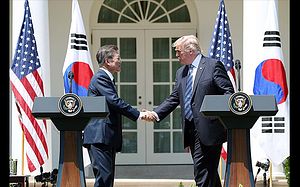Khang Hyo-shang, a South Korean opposition lawmaker, is at the center of a growing political storm after allegedly jeopardizing national security for political gain.
Khang procured details of a May 7 phone call between Presidents Moon Jae-in and Donald Trump through a contact at the Ministry of Foreign Affairs. The conservative legislator then went public with the classified information at a press conference on May 9, speaking critically of a Moon request for Trump to visit Seoul after the United States president’s May 25-28 state visit to Japan. Khang also mentioned specific North Korean nuclear sites discussed in the conversation.
It is, however, Khang’s actions rather than the contents of the phone call that have been met with widespread condemnation.
According to Foreign Ministry regulations, the transcript of the phone call is classed as level 3 confidential. Level 3 is the broadest and lowest of the three classes of classified data, which if exposed could put national security into “considerable danger.” Article 113 of the criminal code of South Korea stipulates that disclosure of such information carries a penalty of up to five years imprisonment or a fine of up to 10 million won (roughly $8,300).
Khang acquired the information through a working-level diplomat stationed at the South Korean embassy in Washington. The diplomat in question is linked to Khang through high school and university ties and returned to Seoul to face a criminal investigation. The diplomat, who was fired on Thursday, claims to have been unaware that Khang would put the information in the public domain and attempt to frame the phone call as “begging diplomacy.” An internal Ministry of Foreign Affairs investigation also includes two other suspected cases of leaks from the diplomat to Khang, including information potentially used in parliamentary questions to the prime minister in March.
Moon’s Democratic Party and others accuse Khang of breaking the law for political point-scoring while the opposition have refused to take disciplinary action and argue that Khang acted in the public interest. Criticism has not only come from the ruling party; former diplomats from across the political spectrum have also spoken out against Khang. Former United Nations Secretary-General Ban Ki-moon and former Ambassador to the United Nations Kim Sook both condemned Khang’s conduct. A former national security adviser to conservative President Lee Myung-bak, Chun Young-woo, accused Khang of engaging in criminal behavior and urged the conservative leadership to expel the lawmaker from the party.
Khang’s Liberty Korea Party (LKP) leadership have stood by the embattled parliamentarian, seeking to downplay the incident and defend Khang’s actions. They argue that Khang acted in the public interest and that the contents of the phone call fall under people’s right to know. LKP floor leader Na Kyung-won has gone so far as to imply that Moon orchestrated the whole saga in order to repress conservatives and block the resumption of the parliamentary session. Na also stated that the party would not comply with a potential summons from the prosecutor’s office.
The snowballing scandal provoked a response from a South Korean executive that does not ordinarily comment on parliamentary affairs. In an uncharacteristically strong statement on May 29, Moon labelled the affair “disgraceful” and reminded the opposition that they should win the right to run state affairs by convincing the public at the ballot box. Moon also called for basic common sense to prevail in the conservative opposition camp.
While the LKP have attempted to frame these leaks as being in the public interest and falling within the legal bounds of citizens’ right to know, these arguments are unlikely to stand up to investigative scrutiny. By revealing the contents of a private phone call, Khang potentially undermined U.S. trust in Korean diplomats and risked discouraging the exchange of intelligence through such channels in the future. It is therefore difficult to see how the public interest has been served. With legal action ongoing, the focus on Khang is set to continue over the coming weeks.
Kyle Pope is Korea Policy Analyst at Future Risk.
Adam Pepin-Hall is a Korea watcher at the University of London’s School of African and Oriental Studies.

































